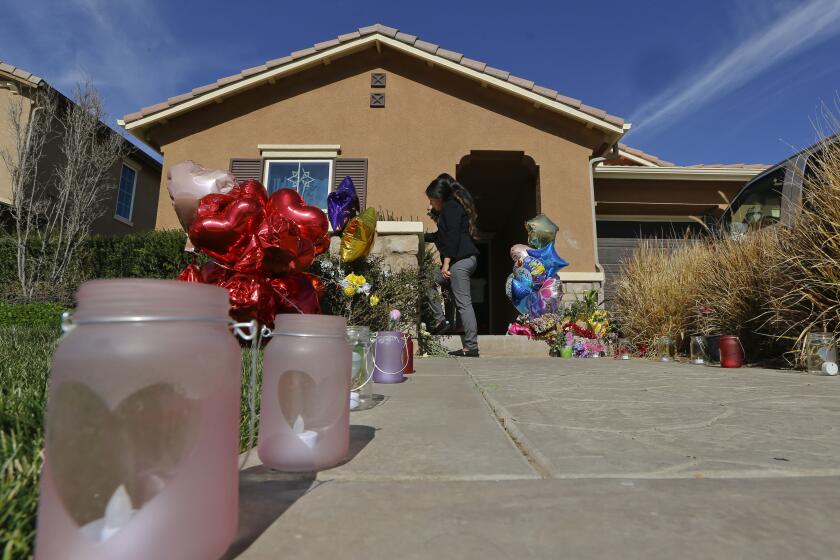Shifting Fronts in the Battle Against AIDS
“When you love somebody, you love somebody,” says the boyfriend of Denise LaVigne. With her for 15 years, he stayed at her side even after she learned she was HIV-positive in 1990. “I am here,” he says.
The AIDS Services Foundation of Orange County is just as steadfast with its clients. “We’re here to serve people with HIV disease to the best of our ability, as long as they need us,” says Priscilla Munro, the Irvine foundation’s executive director.
With new drug cocktails--built around protease inhibitors--helping HIV patients live healthier, longer lives, new questions have arisen for people like LaVigne, 44, and her boyfriend. And for the AIDS Services Foundation.
How many years can an antiviral drug extend one’s life? With a reduced need for at-home medical services, how can the foundation best serve its 730 clients? Will the public, armed with the good news about the drugs, be less compassionate in its philanthropic response to the foundation?
The medical community has a wait-and-see attitude about the success of antiviral medications, says Dr. Jorge Rodriquez of Newport Beach, a member of the ASF board. “It’s not time to let the balloons drop yet. We’re happy, but we’re not celebrating.
“Even though the inhibitors have slowed the virus down,” they’re not a cure for AIDS, he says. “And our role, and that of the foundation, will be increased. There will be AIDS patients in varying degrees of health because they develop resistance to these medications.”
Since the protease inhibitors--so named because they attack an enzyme called HIV protease--became available 18 months ago, the foundation has seen a 38% drop in its client mortality rate, Munro says.
But what that means for ASF is “more people on caseloads than we’ve ever had in the 12-year history of the organization,” she says. It is estimated that more than 7,000 men, women and children in Orange County are infected with HIV.
“It’s about a shift in need,” Munro explains. “Those responding positively to the treatment no longer need home care. But now, there’s a greater need for client education about the medications and how to take them.”
Says Rodriquez: “The key is that we will need to monitor them.”
Clients can also avail themselves of the counseling, transportation and housing services available through the foundation. “Our basic philosophy is that we will serve people with HIV disease until there is no one else to be served, until we are not needed anymore,” Munro says.
*
The foundation’s financial supporters have been steadfast too, even with the news that AIDS patients are living longer, healthier lives. “We’ve given our donors a clear picture of what’s going on and have not seen a decline in private giving,” Munro says.
To meet its annual $4.5-million budget, the foundation relies on government assistance and donations from the private sector. Funds are also raised at benefits such as AIDS Walk Orange County, which will be June 1 at UC Irvine. “We expect our net proceeds from AIDS walk to be about $350,000,” Munro says.
Using a case-management format, the foundation uses health care professionals--nurses, social workers--to determine the needs of each client. “We tailor our services to their individual needs,” Munro says.
LaVigne, of Costa Mesa, is grateful for the services the foundation provides. “I’ve needed a nurse’s aid and transportation because I don’t drive--my concentration is not what it once was,” she says.
She is most grateful, however, for Kids Club, a foundation support group for children of AIDS patients. “Kids Club is the most precious gift ASF could have given me. The day I had to tell my daughter I had a life-threatening illness was the worst day of my life,” she says of Emily, 12. “Kids Club has helped her through it.”
Several months ago, LaVigne underwent drug therapy for AIDS using the protease inhibitors. At first, she felt wonderful. “The drugs brought me back to life,” she says.
Three months later, she ran a fever of 104, “and the drug was pulled from under my feet.”
“I am failing the drug. It is very painful when, suddenly, you are given hope and then it’s taken away and there’s nothing you can do,” she says. “Intellectually, you tell yourself it’s not your fault. Emotionally, you feel you have done something wrong because your body is saying no.
“You hear a lot of good things about these drugs, but there’s another side; some people can’t tolerate them.”
Even with the new antiviral drugs, LaVigne says, AIDS patients “are still very much like damaged goods--the ones in the little supermarket baskets with the dents.
“You still need the counseling,” she says. “During treatment, I always had nausea and, at one point, diarrhea for 45 days. It does play a number on your mind.”
Through it all, her boyfriend and the AIDS Services Foundation have stood by.
“He once said the most beautiful thing to me,” she says of the man she plans to marry this month. “One day, I asked him: Why didn’t you leave when I was diagnosed? He said, ‘It didn’t happen to you, it happened to us.’ ”
More to Read
Sign up for Essential California
The most important California stories and recommendations in your inbox every morning.
You may occasionally receive promotional content from the Los Angeles Times.










